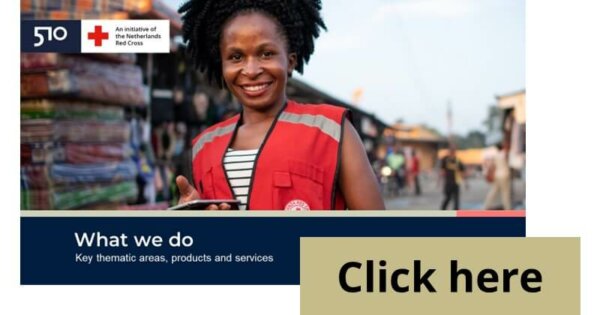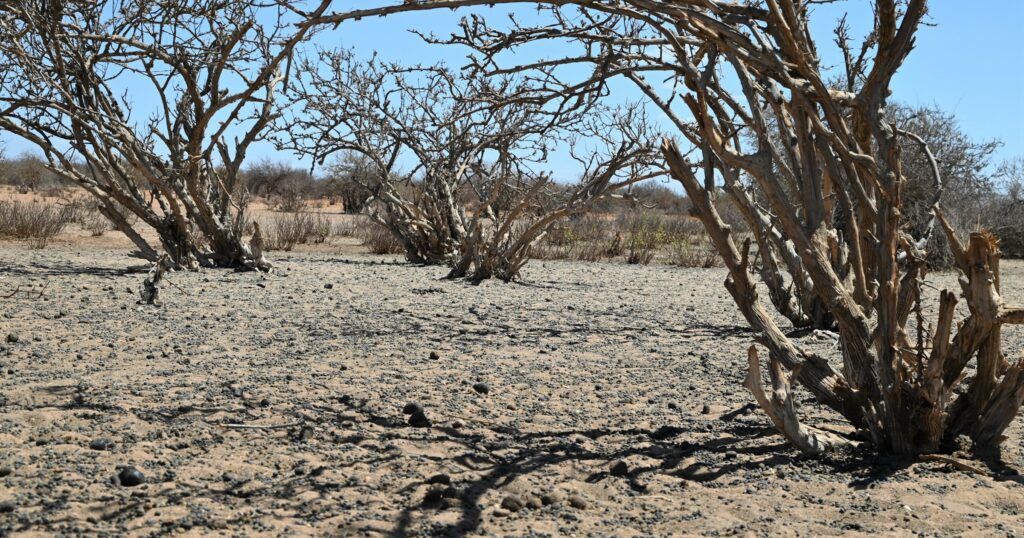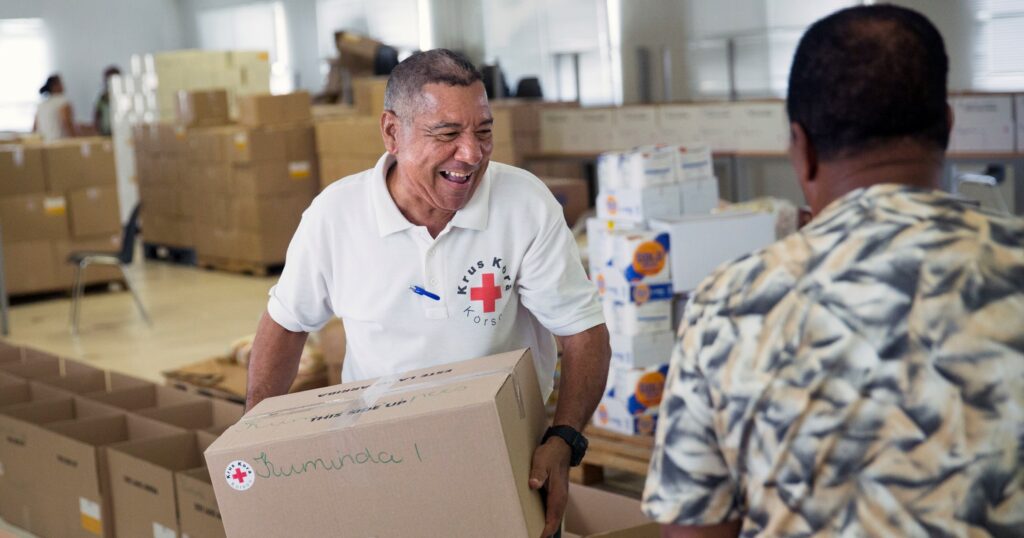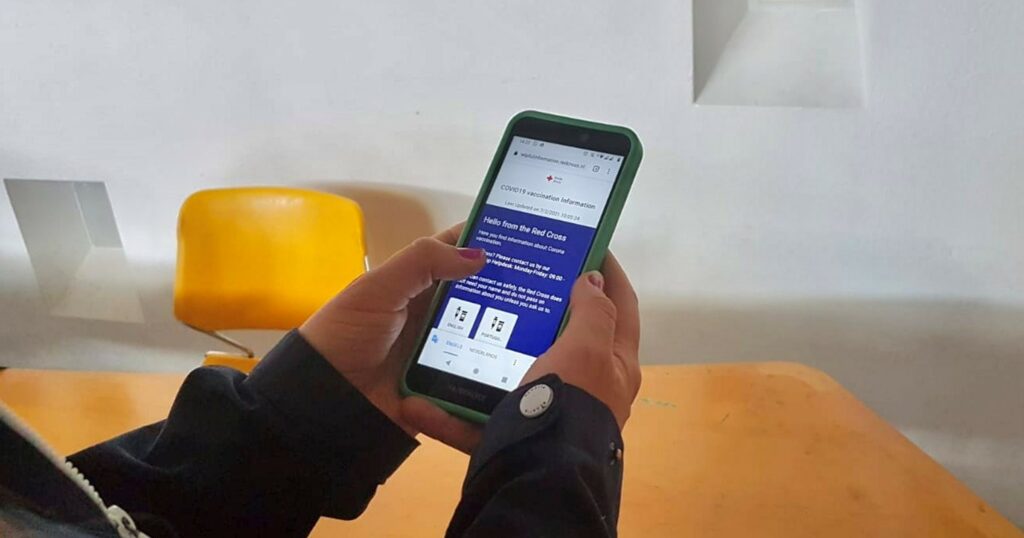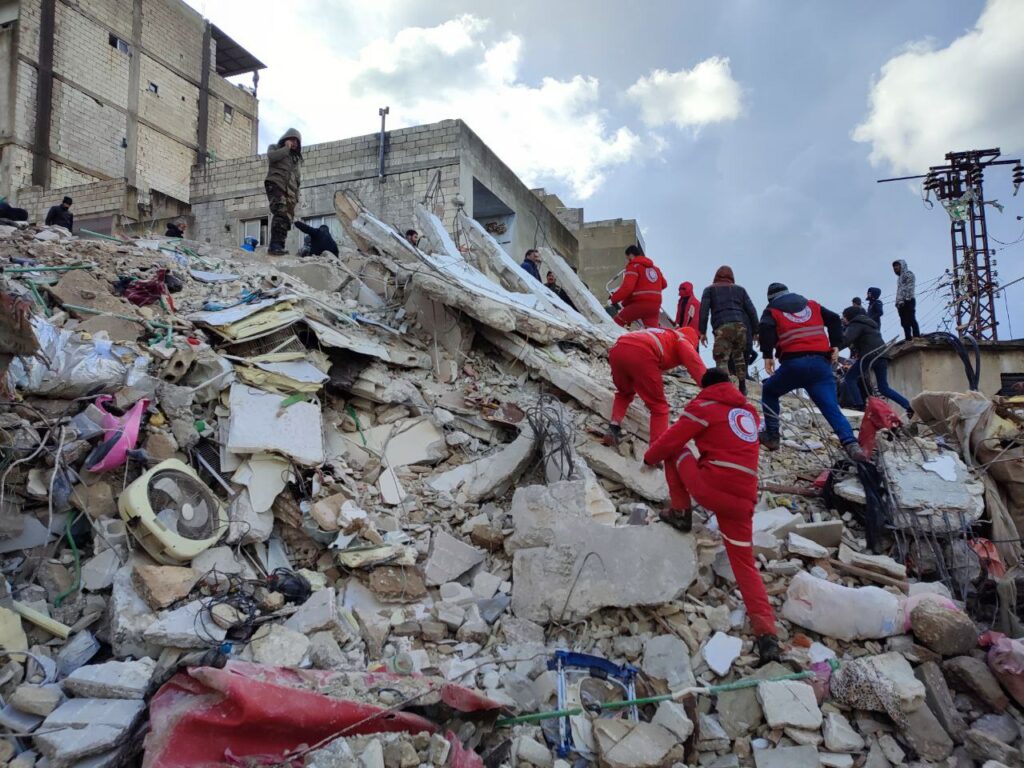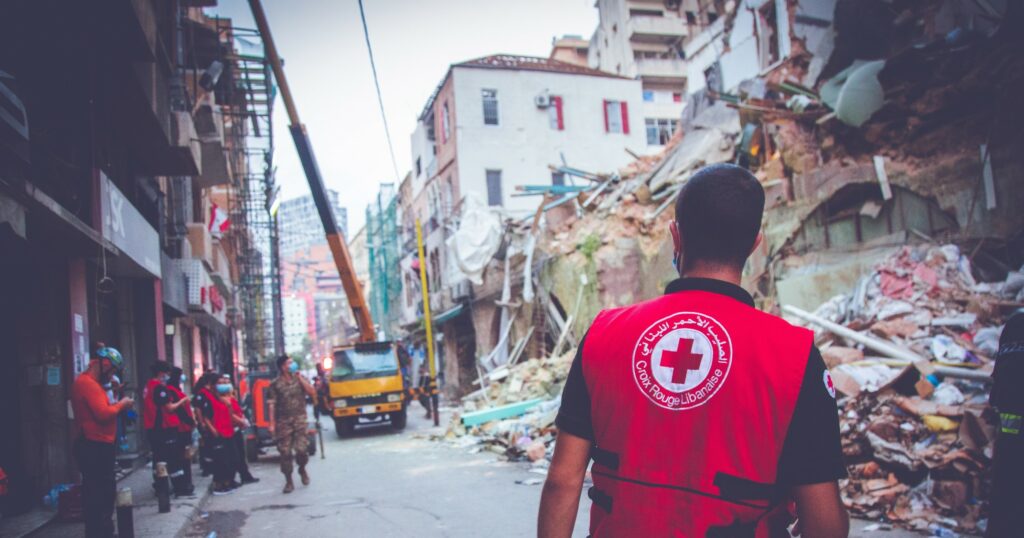510 (the Data & Digital initiative of the Netherlands Red Cross) is celebrating its 7th year anniversary this month. Founded in 2016, 510 has become one of the leading data & digital establishments supporting humanitarian organizations in providing aid to people affected in some of the world’s most hazardous and conflict-ridden areas. Together with the 510 team, we are looking back at 7 matters in which 510 made an impact throughout the years.
What we do
Read more about the products and services 510 provides (pdf).
‘We support National Societies with data and digital products and services for Anticipatory Action, Cash & Voucher Assistance, Digital Transformation, Emergency support, Digital Engagement and Water & Landscape. Our dedicated team of staff, professional volunteers and research students are the backbone of our work. It’s incredible to see how many national societies we have been able to support with improving their humanitarian operations’
-Maarten van der Veen (founder and team lead 510)
1. Unlocking the Potential of Anticipatory Action
Anticipatory Action turns forecasts and warnings from descriptions of what the weather will be into assessments of what the weather will do, enabling organizations and individuals across the world to mitigate the impacts brought by extreme weather and climate events such as typhoons, floods, and droughts. Our Anticipatory Action work involves identifying key indicators of these events and the impact on social, economic, and environmental systems, and developing strategies and solutions that can mitigate the negative impacts of these drivers and help build community and societal resilience.
“Anticipatory action is an essential addition to humanitarian response and preparedness, as it is about acting before a disaster occurs to reduce its impact on communities and their livelihoods.”
-Marc van den Homberg (Thematic coordinator Anticipatory Action 510)
Presently, 510 has supported 12 National Societies with their Anticipatory Action efforts in close collaboration with the Host and Partner National Societies, IFRC, and the Climate Centre. 510s support focuses on characterizing risk, developing hazard-impact databases, trigger models, and a corresponding decision support tool (510s Impact-based forecasting portal). 510 developed trigger models for multiple hazards, such as drought, floods, tropical cyclones, and epidemics. The trigger model for tropical cyclones in the Philippines has been adopted by other agencies. 510 developed together with the Philippine and German Red Cross the Typhoon Trigger Model, which reached its next stage of Maturity. The model not only triggers the Disaster Response Emergency Fund (DREF), but also the UN’s Central Emergency Respond Fund (CERF) and Anticipatory Action funds of other NGOs in the Philippines. 510’s Impact Based Forecasting Portal (IBF Portal) is a digital one-stop-shop of information that supports the decision-making of disaster managers during anticipatory action operations. The IBF Portal visualizes this Trigger Model and gives clear actionable steps for a National Society. The IBF Portal has been implemented in more than 10 countries. Two recent examples are flood and drought anticipatory action in Zambia and Zimbabwe respectively. In 2022 the IBF Portal for floods became fully operational in Zambia. For droughts, the Trigger Model has been developed together with the Zimbabwe Red Cross and it became.
2. Supporting the Digital Distribution of Cash and Voucher Assistance
Cash aid is an important part of humanitarian aid, as it allows people to meet their basic needs in times of crisis. In times of conflict and disasters, Cash and Voucher Assistance (CVA) can provide essential support to those affected, allowing them to purchase vital items such as food, shelter, and medical supplies. CVA is also a more efficient way of providing aid, as it allows affected communities to choose the items that best suit their needs. Furthermore, this form of humanitarian aid can be used as economic stimulus, providing an impetus for economic growth in areas that have been affected by crises. In this way, Cash and Voucher Assistance has the potential to provide much-needed relief to people in vulnerable situations in a way that is both effective and empowering. The IFRC is a world leader in Cash and Voucher Assistance and is committed to delivering 50% of its humanitarian assistance through cash and vouchers by 2025.
“Cash and Voucher Assistance is a vital tool in the humanitarian field, providing families and individuals with the ability to purchase the essential necessities and resources they need to survive and rebuild their lives.”
-Lars Stevens (Thematic coordinator Cash and Voucher Assistance 510)
To this end, 121 is a Cash Information Management platform that we co-designed with people affected and aid workers. It aims to support National Societies to scale up their cash programs. The platform launched in 2021 to support undocumented migrants in undocumented situations in the Netherlands, and the platform started being scaled up internationally in 2022. In addition, 510 provides Cash Information Management services to National Societies which reduces the administrative workload and introduces bite-size digital improvements in providing people affected with cash or vouchers. In 2020 for instance, the cash program in Curaçao, Aruba, and Sint Maarten reached 3500% more people than before by digitizing the local operations. So far, 510 has supported over 30 National Societies in their cash programs.
3. Harnessing the Power of Community Engagement and Accountability
Community Engagement and Accountability (CEA) is a way of working that recognizes and values all community members as equal partners whose diverse needs, priorities and preferences guide everything the Red Cross Red Crescent network does. This is achieved by integrating meaningful community participation, open and honest communication and mechanisms to listen to and act on feedback data. It is an essential component in the humanitarian sector as it allows communities to be involved in decisions that directly affect their lives. Evidence and experience shows that CEA helps to ensure that solutions are tailored to the needs of the community, which make them more appropriate, effective and sustainable. CEA also helps to build trust between communities and humanitarian actors, providing opportunities to foster relationships, create local networks, and build resilience. It provides humanitarian actors with local knowledge, needs and insights which help to inform decision-making and the design of intervention
“Community Engagement and Accountability is essential to the success of any humanitarian effort. It gives the people who are most affected by disasters or crises the opportunity to raise their voice and ensures that programs and operations are meaningful, sustainable and of high quality“
-Jonath Lijftogt (Thematic coordinator Community Engagement & Accountability 510)
The IFRC aims to place local communities at the very centre of change so that actions are effective, inclusive and sustainable. With Digital CEA, 510 supports this process. Our team designs and develops products and services that help National Societies and their partners in having meaningful and scalable engagement with the communities they serve. The first Digital CEA product, the Helpful Information as Aid web-app, was launched in 2020 to provide information about services the Red Cross Red Crescent network or other (local) aid organizations offer. This first app of this kind was designed with and for undocumented migrants living in the Netherlands and has been visited over 5.000 times to date. In 2022, HIA was also used to help Netherlands Red Cross staff and volunteers answer Frequently Asked Questions from people fleeing Ukraine who were arriving in the Netherlands. To further support the IFRC and National Societies in their response to the conflict in Ukraine, 510 created a tool and a process for Social Media Listening (SML). We pull data from instant messaging platforms to see what people affected by the crisis think about their situation, what they need and how they interact with humanitarian organizations providing support. Combining qualitative and quantitative data and identifying key trends from these conversations helps the IFRC and the National Societies mitigate risks and define, implement and improve (CEA) programs and information campaigns.
Finally, together with the IFRC, several National Societies, the Norwegian Refugee Council and other partners, 510 has been working on piloting and implementing the Digital Engagement Hub (DEH). With DEH, we aim to create a standardized product package which facilitates local, scalable and meaningful engagement through digital devices and communication channels between humanitarian organizations and communities. So far, we have collaborated on DEH with eight National Societies on DEH.
4. Strengthening delivery of aid with Digital Transformation
Digital Transformation can drastically improve the efficiency and effectiveness of humanitarian relief and preparedness efforts as it is able to better identify and target those who are in need of aid and ensure that resources are distributed in a more equitable manner. Additionally, Digital Transformation can help to streamline the process of providing aid, such as supporting a more efficient registration process for affected communities. Finally, it can also help to improve the efficiency of data collection and analysis, which can then be used to inform more effective relief and preparedness strategies.
“Digital transformation is a key enabler of smart and accountable humanitarian aid. It allows us to better understand and respond to the needs of people in vulnerable positions, and it increases our capacity to reach and interact with them.
-Liselot Kattemölle (Thematic coordinator Digital Transformation 510)
In its Strategy 2030, the International Federation of Red Cross and Red Crescent Societies (IFRC) highlights digital transformation as one of the main transformations required to address the global challenges of this decade. As such, the IFRC adopted a Digital Transformation strategy in 2021 to accelerate the use of technology in the humanitarian services delivered by its 192 National Societies. 510 is a key driver of this strategic objective by developing digital products and services together with National Societies, but also by guiding them in establishing data and digital capacity to improve the humanitarian services they deliver.
Together with the IFRC Digital Transformation team, 510 has led the development and implementation of a digital transformation assessment that supports National Societies to map their current and desired capacity for people, processes, and technology. This assessment methodology has been adopted in more than 50 National Societies, in collaboration with IFRC regional offices, the Spanish Red Cross, and the British Red Cross. 510 guides National Societies to mobilize resources based on their digital transformation assessments. Moreover, 510 is a key contributor to the IFRC’s Data Playbook which was launched in July 2022, with the help of 100s of Red Cross Red Crescent staff, volunteers, and partners. This tool includes social learning content that is designed to assist National Societies in their data journey. In addition, a free Data and Digital literacy introduction course became available that is intended for anyone interested in learning about data, information, digital technologies, and their responsible use within the context of humanitarian aid.
5. Effective Resource Allocation Through Emergency Support
When disasters or conflicts cause suffering and hardship for vulnerable populations, emergency support is necessary to provide essential relief and aid including food and shelter, medical care, and psychosocial support. As such, it is an important part of a larger humanitarian response, as it helps to ensure that those affected by disasters receive the support they need to recover.
“Data and digital tools are essential in providing a rapid, coordinated, and effective response to humanitarian crises. It is a vital way to improve the efficiency of aid to people affected.”
-Jacopo Margutti (Thematic coordinator Emergency Support 510)
Emergency support with data and digital tools has been a key area of work since the very beginning of 510. We have been deployed more than 20 times as information managers into affected areas, directly supporting field-level operations and using those experiences to build more and better digital tools to help aid workers in emergencies. Damage assessments are a great example: after Hurricane Irma caused great devastation in Sint Maarten in 2017, 510 conducted a Damage Assessment using drones that were flown over the island, cataloging and open-sourcing more than 13,000 buildings. Following that experience, we researched how to automate the procedure, and ultimately deployed a fully Automated Damage Assessment (ADA) for the emergency response to the 2020 Beirut port explosion. ADA is based on a deep learning model that identifies damaged buildings in high-resolution satellite images. Automating this assessment makes it faster and far less dependent on human effort, therefore enabling 510 to quickly deliver the information that is needed. Most recently, ADA was deployed in response to the earthquakes in Türkiye and Syria at the beginning of this year, to map damage in eight cities across the region and thus help the Red Cross and Red Crescent teams prioritize intervention areas and resource allocation.
6. Digital Solutions for Water & Landscape Management
In the humanitarian sector, data and digital water and landscape support allow for more efficient and targeted water resource management. By using digital tools to monitor and support water resources, humanitarian workers can better understand the needs of communities, identify areas of vulnerability and provide more effective and sustainable water solutions as a form of relief to people in vulnerable situations around the globe. Digital water and landscape support also enable humanitarian workers to provide relief to more remote areas, as it can provide a faster and more accurate picture of the environment. Being at the forefront of responding to global water, sanitation, and hygiene (WASH) needs, the IFRC aims to protect nature and lives and to reduce disaster risks by working with nature.
“Access to safe, clean water and the protection of our landscapes are fundamental to the health and wellbeing of all people.”
-Marijke Panis (Thematic coordinator Water & Landscape 510)
To this end, 510 developed the Landscape Restoration Toolbox. One of the tools, Historical Analysis, allows for easy comparison between two satellite images of the same region. The tool shows which areas have been affected by deforestation. The site suitability analysis helps identify zones that should be prioritized in the response, as well as zones where the reforestation success rate may be higher, making it an important decision support tool that can guide project managers in selecting the areas to be reforested first. An example of landscape restoration is the Green Pearls project in Haiti, a country in the Caribbean that is prone to frequent earthquakes, hurricanes, and floods. Since 2019, the Haiti Red Cross Society and the Netherlands Red Cross under the Princess Margriet Fund have been working to restore Haiti’s reputation as the ‘Green Pearl’ of the Caribbean through the development of many smaller green pearls – communities that balance human needs with natural resources and economic development. After Haiti was struck by a 7.2 magnitude earthquake in August 2021, 510’s Historical Analysis tool played an important role in this project by providing a scan of satellite images before and after the earthquake to create an overview of the most affected areas to be restored. At the time, the 510 data team provided regular digital support, giving insight into the situation, risks and opportunities.510 has been supporting the Dutch Surge Support (DSS-Water) and Disaster Risk Reduction (DRR)Team with Information Management support. DSS-Water and 510 aim to rapidly respond in emergency situations, making use of the DSS-Water network of experts to deploy suitable candidates into the field at the request of humanitarian organizations. 510 provides technical expertise to support deployed water experts working in a humanitarian context. DSS-Water experts most often have a background in Civil Engineering, Environment, or Health, but not necessarily Information Management. As an example, in collaboration with the IOM WASH team, DSS Water, Deltares and 510 experts worked on a flood model for sustainable drainage in Nigeria.As part of the Fellowship “Analytics for a Better World in late 2022, 510 also worked on an analysis to identify areas in three localities in West Darfur State, Sudan, which are most suitable for borehole sampling, taking into account the presence of population, flood risk and social unrest. Read more about this project including code on GitHub هنا
7. Uniting Students and Volunteers to Advance Humanitarian Aid
Volunteers and students are integral to the success of humanitarian efforts as they bring a wealth of knowledge, experience, and enthusiasm to any humanitarian project. Volunteers in 510 are an invaluable source of support for the team as they strengthen our projects with their skills in data science, data analytics, design, geoinformation science, translations, software development, data responsibility, and business economics. Either through collaborations with organizations such as Analytics for a Better World or individuals that want to steadily contribute to a better world. Meanwhile, students bring to 510 the latest scientific advances which are then applied in projects during graduate research work or an internship in collaboration with universities. In general, the majority of our students work on anticipatory action. Our volunteers work across all projects in 510. By engaging with students, organizations can ensure they are equipped with the skills and knowledge necessary to effectively address the issues they are tackling. Since 2016, 510 has had the honor to work with 200+ professional volunteers, 100+ corporate volunteers, 16 interns, and 138 research students.
“Volunteers and students are the spark that accelerates projects within 510, essentially increasing the efficiency of humanitarian aid and reaching more affected people.”
-Corina Markodimitraki (Volunteer coordinator 510)
Future prospects
As technology advances, the use of data and digital tools will become increasingly vital in improving the speed, quality, and cost-effectiveness of humanitarian aid. They help to identify needs, target resources, track progress, and measure important outcomes, as well as to understand and monitor the impact of interventions and ensure that the populations in the most vulnerable positions are reached and served. Additionally, data and digital tools can be used to provide real-time feedback, enabling organizations to quickly adapt and respond to changing needs. The use of data and digital tools in the humanitarian field will create opportunities for more efficient and effective interventions, and ultimately, a more sustainable and equitable world for everyone. Over the next few years, 510 will focus on scaling existing products and services, by working closely with IFRC, ICRC, and National Societies. We want to ensure we can help National Societies support millions of people affected. We aim to be fully complementary to what others in our network are offering. We will focus on the sustainability of these products and services, to ensure we can provide them with high quality over a long period. We will innovate with business models that will allow us and national societies to implement data & digital products and services cost-effectively.
“Data and digital technology in the humanitarian field continues to create powerful possibilities for a safer future. With the right investments and commitment, data and digital solutions can revolutionize the way we tackle the world’s most pressing humanitarian challenges.”
-Maarten van der Veen (founder and team lead 510)
What we do
Read more about the products and services 510 offers هنا.
